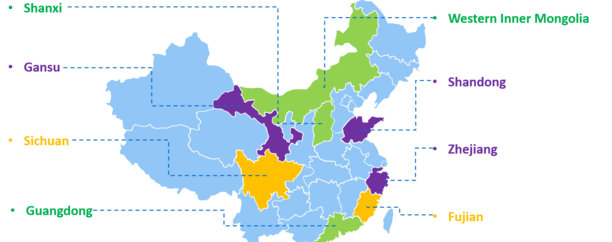
October 2019 – At the end of 2018, the National Development and Reform Commission (NDRC) and National Energy Administration (NEA) published new guidelines for the design of energy spot markets, which have already started trial operation in eight provinces. By the end of 2019, interprovincial electricity trading will also be possible. Through establishment of spot markets, China seeks to derive standards and procedures for the transition to a nationwide market-oriented electricity trading system.
Against this backdrop, the AHK Greater Beijing invited some 30 business representatives and experts to a networking meeting held on 16 October. At the event organised as part of the Carbon Market Cooperation project funded by the German Federal Ministry for the Environment, Nature Conservation and Nuclear Safety (BMU), two renowned experts informed about the new spot markets and their implications for emission reduction in China’s electricity sector.
Dr. Nan Jian of the Tsinghua University talked about the implementation of the eight new pilot energy spot markets: Shanxi, Gansu, Sichuan, Guangdong, Fujian, Zhejiang, Shandong and Western Inner Mongolia. Concerning the expert, the main objectives and tasks of the spot markets are above all the liberalisation of the fixed price mechanism, the establishment of platforms for energy trading, improved integration of renewable energies and more effective energy generation and network planning.
Second speaker Daniel Wetzel of the Rocky Mountain Institute presented his work on energy market reforms and spot markets. Wetzel is convinced that the spot markets will have a fundamental impact on energy generation processes in the future, for example in the form of lower energy prices or less electricity from coal-fired power plants. The spot markets could thus contribute to reducing production costs and CO2 emissions by 4-12 percent.
A detailed report on the networking meeting is contained in the October issue of Econet Monitor, a magazine published by AHK Greater China in Beijing. The article can be downloaded here.
Note: This publication is only available in German.
Cookie Settings
Marketing-Cookies werden von Drittanbietern oder Publishern verwendet, um personalisierte Werbung anzuzeigen. Sie tun dies, indem sie Besucher über Websites hinweg verfolgen.
Provider:
Statistik Cookies
Statistik-Cookies dienen der Analyse und helfen uns dabei zu verstehen, wie Besucher mit unserer Website interagieren, indem Informationen anonymisiert gesammelt werden. Auf Basis dieser Informationen können wir unsere Website für Sie weiter verbessern und optimieren.
Provider:
Erforderliche Cookies
Erforderliche Cookies sind für den reibungslosen Betrieb der Website zuständig, indem sie Kernfunktionalitäten ermöglichen, ohne die unsere Website nicht richtig funktioniert. Diese Cookies können nur über Ihre Browser-Einstellungen deaktiviert werden.
Provider: